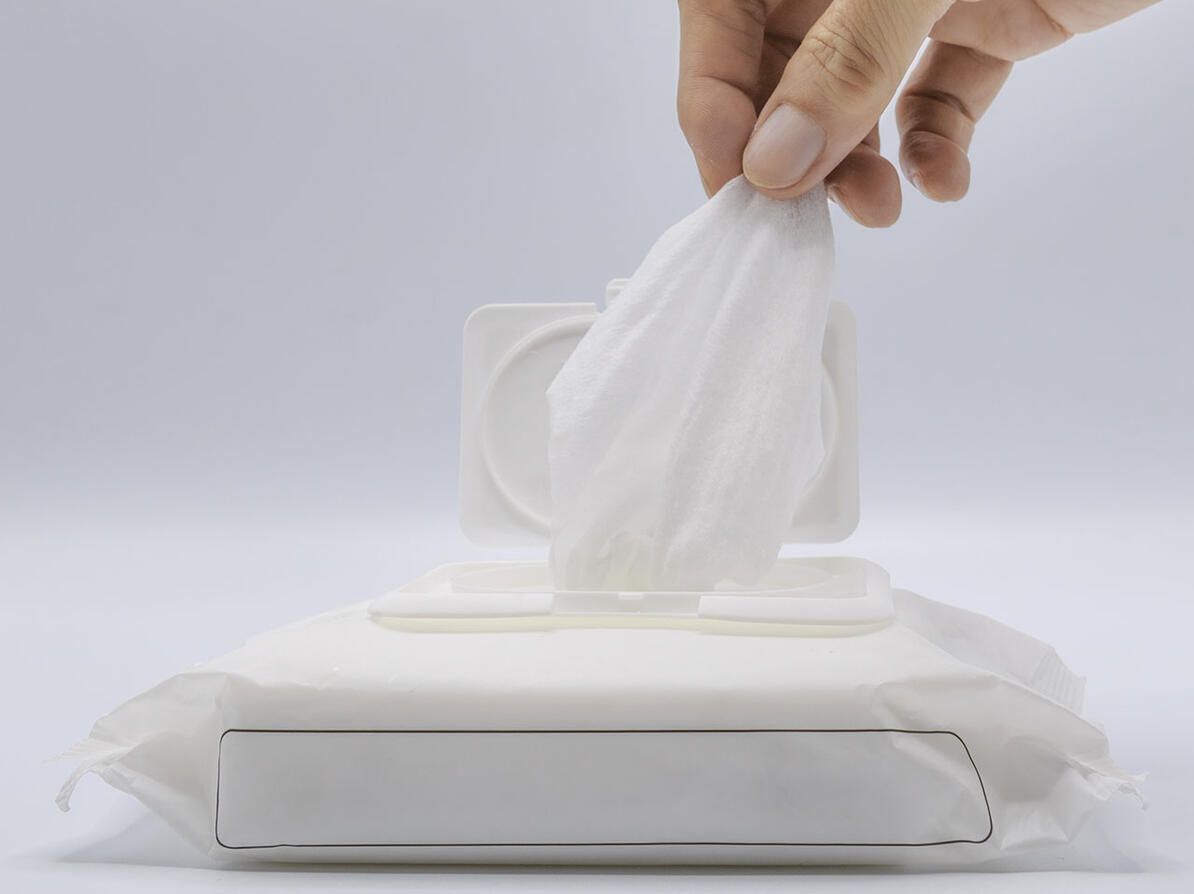Test: Chemicals in wet wipes
Wet wipes are practical on the go, but can also contain perfumes and environmentally harmful substances. We have tested 49 packs of wet wipes for unwanted chemicals.

Wet wipes clean easily and quickly your baby's nose, fingers or buttocks. However, wet wipes are a cosmetic product that can contain perfume.
Unfortunately, there is an increase in children with perfume allergies. Therefore, the Danish Environmental Protection Agency and the Danish Consumer Council THINK Chemicals recommend that you completely omit products with perfume for children.
In the test of wet wipes, 22 out of 49 products contain perfume. Perfume gives the lowest chemical rating C.
Be critical of online shopping
We have also tested wet wipes purchased online and parallel imported. These products may be cheaper, but they often contain perfume.
Several Danish importers state these products are not intended for the Danish market.
Do you buy the wet wipes online? Then there is a greater likelihood of unwanted perfume in the product than if you buy them in the supermarket.
Select the Nordic Swan Ecolabel and the allergy label
Do you want to avoid unwanted chemicals? Look for products that are the Nordic Swan Ecolabel/EU Ecolabel and marked with the blue label from Asthma-Allergy Denmark or Allergy Certified.
There are a number of requirements for chemicals here, and they do not contain perfume. They can be bought in most supermarkets.
Water and cloth are better than wet wipes
We recommend that you use cloth and water instead of wet wipes when changing nappies.
Although the wet wipes do not contain known problematic substances, they still contain preservatives and other chemical substances.
When you use water, you limit your baby's exposure to unnecessary chemicals.
About the test
-
How we tested
The Danish Consumer Council THINK Chemicals has bought a number of wet wipes in Danish shops and on web shops. We have also done research on brands via Kemiluppen and Facebook. Some of the purchased products are clearly imported in parallel, but are available on Danish-language websites.
What we found
We have tested 49 different packages of wet wipes.
How they are distributed:
- 23 products are without a number of problematic chemicals and receive the best rating A.
- Four products contain i.a. phenoxyethanol or environmentally harmful substances and get average rating B.
- 22 products contain i.a. perfume and gets the lowest rating C.
We recommend avoiding perfumes in products for children, because perfumes can cause lifelong allergies. Therefore, perfumes and plant extracts that can cause allergies trigger the C-rating. In adult products, perfume gets medium chemicals rating B.
One of the products with the lowest chemicals rating also lacks an ingredient list on the packaging.
Substances, which give the C-rating:
- Perfume: Many perfume substances can cause allergies. The Danish Consumer Council THINK Chemicals generally recommend avoiding perfumes in baby and children's products. Perfume or perfume substances is included in 22 products.
- Plant extracts: The EU Scientific Committee on Consumer Protection (SCCS) has assessed a number of plant extracts as allergenic. The Danish Consumer Council THINK Chemicals cannot recommend the use of these plant extracts in baby and children's products. 2 products contain allergenic plant extracts.
Substances, which give the B-rating:
- Phenoxyethanol: is a preservative that the French health authorities not recommend used in products intended for the diaper area in children. Children are generally more vulnerable. The sometimes-irritated skin in the diaper area will be able to absorb the substance largely. In this way, children may be exposed to more of the substance than is considered safe. Phenoxyethanol has been found in six products.
- Chamomile or marigold extract: Basket flowers such as chamomile and marigold can cause allergies. As a precautionary measure, the Danish Consumer Council THINK Chemicals recommend baby products without chamomile extracts. However, the risk of basket flower extract in baby care products is not known. Five products contain basket flower extracts.
Claims and instructions for use
Claims and instructions for use on wet wipes can be misleading.
On some of the wet wipes, it says that they are for "daily use". Others state that they are especially recommended for travel use and places where there is no water nearby.
Wet wipes are a cosmetic product that leaves the ingredients on the skin. Therefore, the Danish Consumer Council THINK Chemicals does not recommend wet wipes for daily use, but instead for places where there is no water nearby.
The information about where on the body and in which situations the wet wipes can be used also varies from product to product.
"For use on the face" or "For washing after meals" are examples of instructions on wet wipes. Others emphasize solely that they are for body and hands or for diaper changes. Some products state the wet wipes are not for face cleaning.
Although there are no special rules for products for the face in relation to the rest of the body, there may be ingredients that can annoy the children's eyes. This makes the product unsuitable for use on the face and in the area around the eyes. However, many wet wipes also specifically state that you should avoid getting wet wipes directly in your eyes.
Claims such as "natural", "mild", "99.9% water", "sensitive", "dermatologically tested", "pure" etc. also stands on several products. However, some of these products contain problematic ingredients, such as perfume.
-
What the companies say
Huggies
Retail Partner Danmark ApS points out that, as a distributor, they only sell Huggies Pure and Huggies Pure Extra Care. They import the other versions in parallel.REMA 1000
"We have the following comments to REMA 1000 Ultra sensitive wet wipes,: Phenoxyethanol is an effective preservative used to prevent mold and increase shelf life after opening. The substance is often used in personal care products and is approved by the EU.With the Cosmetics Regulation, the EU has set a number of limit values for ingredients in personal care products and here you can find the limit value for phenoxyethanol. It is currently at 1%. EU legislation is often subject to change, so we are constantly following developments. We have received confirmation from the supplier that these wet wipes comply with the applicable limit value and thus the cosmetics regulation. We thus comply with the applicable legal requirements.
At the same time, the product is Nordic Ecolabelled and certified by Asthma & Allergy, both of which place strict requirements on chemicals in the products.
We have investigated the possibilities of excluding Phenoxyethanol in the product, which will be an option in the future, and this product will be in our stores soon. "
Organyc
Organyc emphasizes that the product is legal and Cosmos Organic certified. They disagree with the approach of doing a declaration test, which they find superficial, and emphasize that:"Benzyl alcohol is not added as a perfume substance but is added as a preservative in the amount of 0.97%. Chamomille and Calendula are organic and added for 0.015% each.
The perfume content is 0.04%. "Nivea / Beiersdorff:
"Safety and high quality of Beiersdorf's products are of course of utmost importance to us. Before we place our products on the market they are tested clinically and dermatologically to guarantee compliance with the highest safety and quality standards, and to ensure that local rules and requirements in all the markets we operate in. We sell NIVEA Baby in many countries, both in and outside Europe, and we have a global range that meets the different needs and preferences of our different consumers.Beiersdorf / NIVEA Denmark does not distribute or sell NIVEA Baby Wipes products in Denmark. Therefore, regardless of which NIVEA Baby products are available on the market or in the e-retail trade, this is by parallel import, which we as a company do not control. However, all ingredients, including fragrances used in NIVEA Baby Wipes products, naturally comply with the legal requirements of European cosmetics regulations and are subject to strict safety criteria and high standards of compatibility. "
Ecovik / Naturaverde
Ecovik states that in the future they will no longer carry the wet wipes from Naturaverde.Sebamed
Sebamed states that the product is not intended for the Danish market. Sebame will discontinue and replace the product with a product not containing perfume, phenoxyethanol or chamomile.Jellyworks
The manufacturer of the Paw Patrol napkins states it has to be a product that is several years’ old, as new products have an ingredient list. They will try to phase out the substance benzyl alcohol.NOTE! The requirement for ingredient list is not new. The production date on the package is set for July 2020.
-
Since July 2021, a number of products containing plastic have been marked with a "plastic in the product". The label points out that the material is made of plastic and that it can harm the marine environment if released into nature.
A large proportion of wet wipes have this mark. There are also a number of wet wipes, which are made of cellulose from e.g. bamboo. They do not have to be labeled with plastic content.
Regardless of the brand, wet wipes can block the sewer system if you flush them down the toilet.
So regardless of the labeling, you should throw them out with your trash. This also applies even if the product is advertised as biodegradable.
-
Be aware that wet wipes can have different durability. For example, ‘Waterwipes’ only have a shelf life of 14 days from the time they are opened, while many others last for 3 months.
